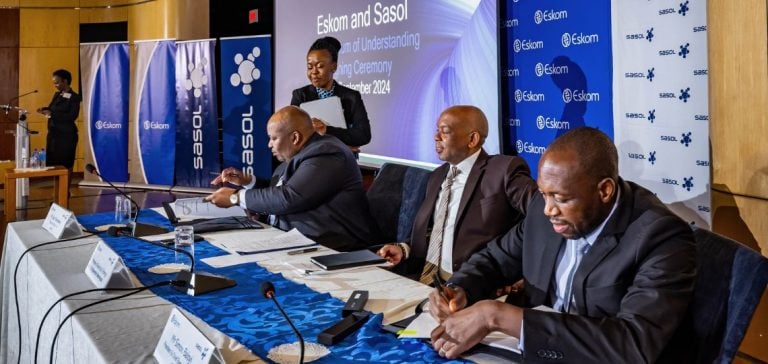With South Africa facing major energy challenges, Sasol and Eskom are looking into the use of liquefied natural gas (LNG) to improve electricity supply and reduce dependence on coal.
The main challenge is to guarantee stability in electricity production, a recurring problem in the country due to load shedding and the inadequate performance of current thermal power plants.
This collaboration is not simply motivated by environmental concerns, but by a strategic desire to secure a continuous supply. LNG is seen as an effective solution for meeting growing energy demand, by ensuring stable base load production.
The two companies are studying the volumes needed to establish a sustainable LNG import market, as well as the infrastructure to be developed to support this initiative.
A strategic partnership supported by the government
The cooperation between Sasol and Eskom enjoys significant political support.
The Minister of Electricity and Energy, Kgosientsho Ramokgopa, mentioned that Qatar, with its abundant reserves and historic relationship with Sasol, is a key partner being considered for LNG supply.
This governmental approach aims to facilitate negotiations between states to guarantee regular access to LNG at competitive prices, while ensuring stable, long-term trade.
The prospects for such an energy transition depend above all on the ability to obtain a stable supply of gas at a controlled cost.
In South Africa, this energy source could serve not only to meet immediate needs, but also to pave the way for reindustrialization in sectors dependent on basic energy.
A project under evaluation
No precise timetable has yet been announced for the completion of this LNG import project.
However, this initiative marks an important step in the diversification of the country’s energy sources.
The use of LNG would strengthen energy independence while diversifying the country’s energy mix.
It could also reduce the impact of fluctuations in the coal market, which is currently experiencing difficulties.
Although coal-fired power plants continue to play a dominant role, the role of LNG in South Africa’s future energy mix could be crucial in stabilizing electricity supply, particularly during peak periods.
This would enable Eskom to reduce service interruptions while meeting growing energy needs.
Major economic challenges
However, the question of financing and investment required to set up LNG infrastructure remains central.
The development of import terminals, distribution networks and gas-fired power plants represents a major cost for South Africa, a country facing budgetary difficulties.
The involvement of private players, and potentially international investors, will be necessary to ensure the viability of the project.
Sasol, which already has commercial relations with LNG-producing countries such as Qatar, could play a crucial role in negotiating supply contracts.
Eskom, for its part, needs to focus on improving its infrastructure to ensure optimal management of the national power grid.
Prospects for South Africa’s energy transition
In conclusion, this collaborative LNG project is part of a broader energy transition strategy for South Africa.
However, the challenges associated with this transition are numerous, from access to gas to the infrastructure and investment required.
The next steps will determine whether LNG can truly play a key role in securing the country’s energy supply in the short and medium term.






















